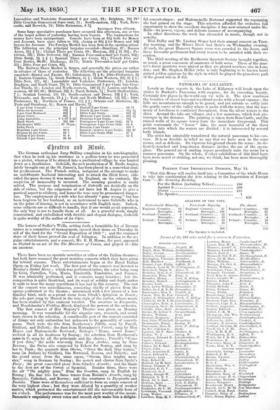There have been no operatic novelties at either of the
Itolion theatres ; but _both have resumed the great morning concerts which they have given for -Several seasons. These entertainments began at the Royal Italian Opera on Friday last week. The first part of the concert was devoted to Rossini's Stabat Mater ; which was performed entire, the solos being sung by Grisi, Castellon, Vera, Mario, Tatuberlik, Tambiiiini, and Formes. It was admirably performed, and it contains many beauties; but the composition is quite theatrical, and its want of solidity and depth makes it unfit to bear the many repetitions it has had in this country. The rest of the concert was miscellaneous, consisting chiefly of pieces from the operas performed at the theatre ; intermixed with a few pieces of a less familiar kind, such as a grand scene from Gluelc's Iphigenia in Tauris ; the solo part sung by Massol in the true style of the author, whose music has been studied by this eminent vocalist. The overture to Euryanthe, and Mendelssohn's Wedding Afarch, displayed the powers of the orchestra.
The first concert of Her Majesty's Theatre was given on Monday morning. It was remarkable for the singular care, research, and sound taste shown in the selection. A considerable part of the concert consisted of things not only unfamiliar but =known to the generality of concert- goers. Such were the trio from Beethoven's Fiddle, sung by Parodi, Giuliani, and Belletti ; the duet from Mercadante's Vest* sung by Miss Hayes and Mademoiselle Bertrand ; Bishop's "Home, sweet home," revived in all its freshness by Sontag ; the selection from Beethoven's MASS in C, sung by all the principals and the chorus ; Purcell's "Come if you dare," the noble war-song from King Arthur, sung by Sims Reeves; the Swiss airs composed by Eckert for Sontag, and sung by her in Paris ; the quartett from Oberon, "Over the dark blue waters," sung (in Italian) by Giuliani, Ida Bertrand; Reeves, and Belletti ; and the grand scene from the same opera, "Ocean, then mighty mon- ster," sung in German by Sontag ; the sestett and chorus from Spohr's Faust ; the great concerted piece from Gluck's Armida ; and the finale to the first act of the Vestale of Spontini. Besides these, there were the air "On mighty pens," from the Creation, sung in English by Sontag ; the fine trio for three tencirs from Rassini's Arm ida, sung by Ilaucarde, Calzolari, and Reeves ; and the overtures to Euryanthe and Faniska. These were of themselves sufficient to form an ample concert of the very highest class ; but they nate diluted by a quantity of weaker matter, which protracted the entertainment till the unreasonable hour of aix o'clock. The performance was for the most part worthy of the music. Baucarde'e exquisitely sweet voice and smooth style make him a delight-
ful concert-singer; and Mademoiselle Bertrand supported the reputation she had gained on the stage. This selection afforded the orchestra full opportunity to show the excellent discipline it has now attained under Mr. Balfe—its power, vigour, and delicate manner of accompanying. In other directions the week has abounded in music, though not in novelty.
Miss Dolby and Mr. Lindsay Sloper had their annual concert on Tues- day morning, and the Misses Birch had their's on Wednesday evening. At each, the great Hanover Square room was crowded to the doors, and these favourite performers had every reason to be satisfied with their re- ception.
The third meeting of the Beethoven Quartett Society brought together, as usual, a great concourse of amateurs of both sexes. Three of the mas- ter's finest quartetts were played as they are played nowhere else in Lon- don ; and Mr. Stephen Heller (who is only beginning to be known here) gained golden opinions by the style in which he played the pianoforte part of the grand trio in B flat.


























 Previous page
Previous page